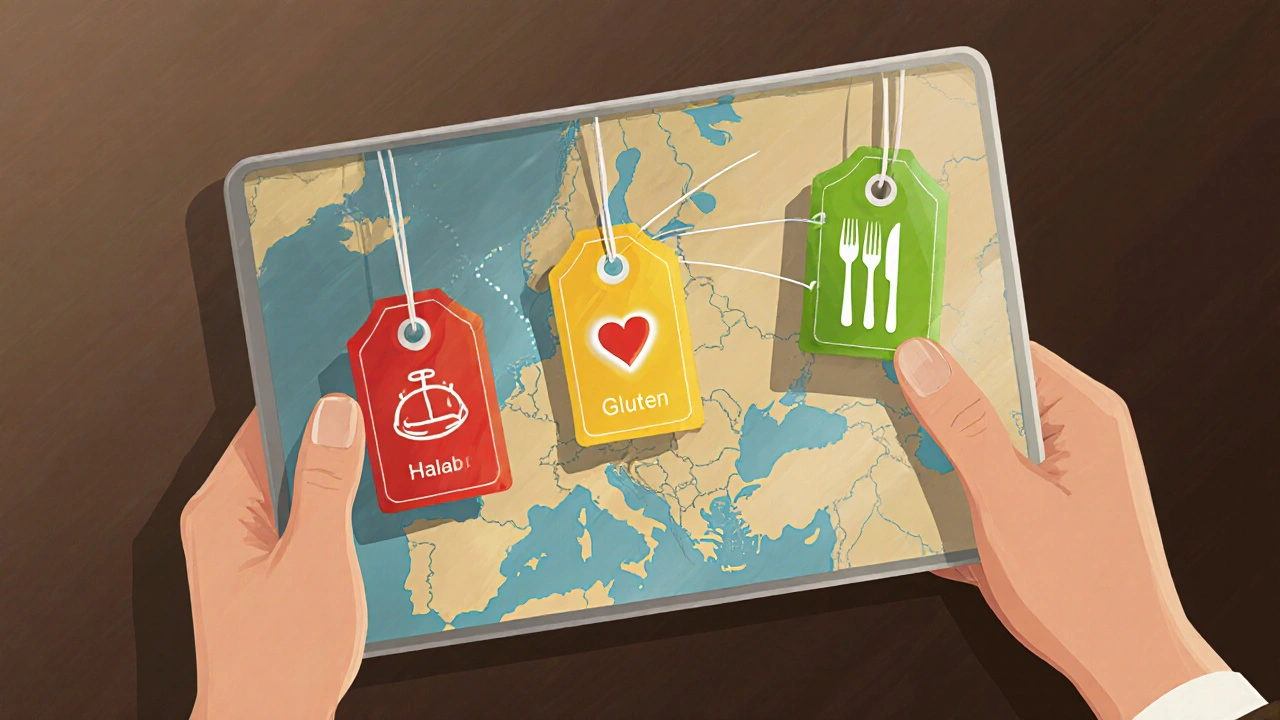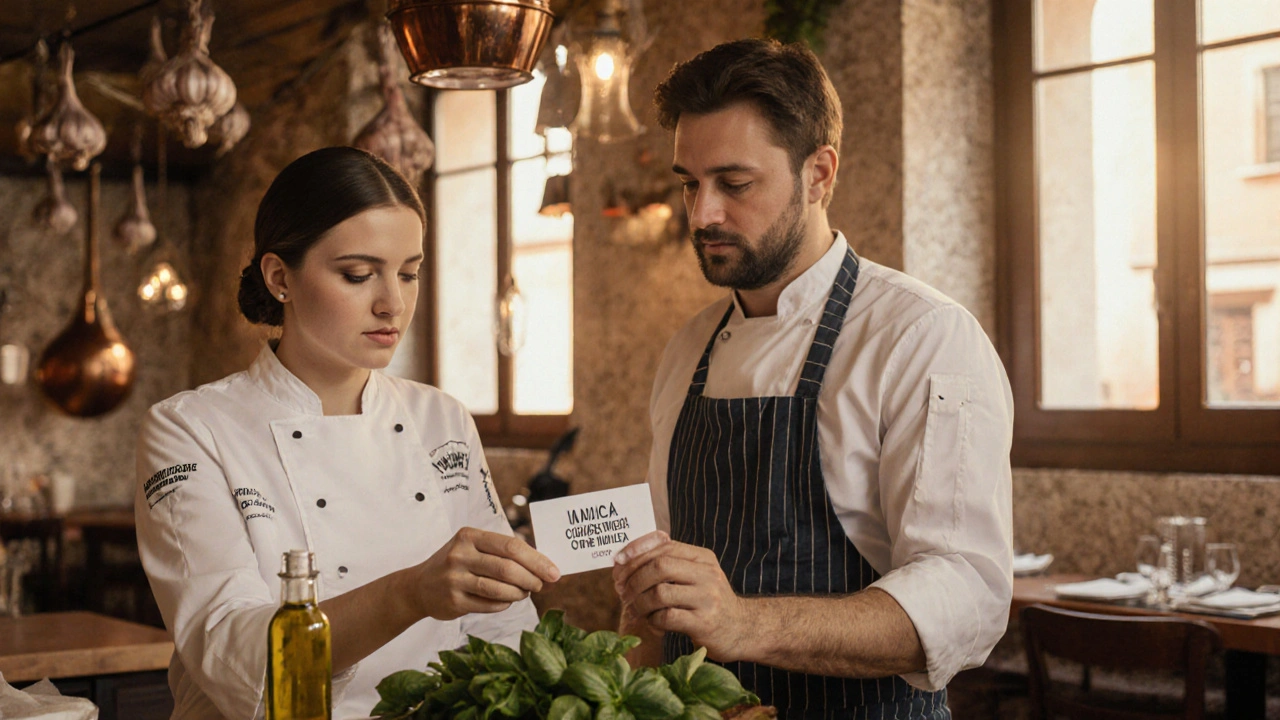Imagine this: you’re on a guided tour through Rome, hungry after hours of walking, and the group stops at a family-run trattoria. The server asks if anyone has dietary restrictions. You raise your hand - you have a severe peanut allergy. The guide nods, pulls out a laminated card in Italian, and hands it to the chef. Ten minutes later, your plate arrives: a simple pasta with olive oil, garlic, and fresh basil, made in a separate pan, with no cross-contamination. No guesswork. No risk. Just a meal you can eat safely.
This isn’t luck. It’s standard practice for professional tour escort services that take food allergies and dietary needs seriously. In 2025, over 38% of travelers report having some kind of food sensitivity - from celiac disease to shellfish allergies, vegan diets to religious restrictions. Tour operators who ignore this aren’t just being careless; they’re putting people at risk. And those who handle it well? They earn loyalty, reviews, and repeat customers.
Why Food Allergies Matter More Than Ever on Tours
Food allergies aren’t rare. The World Allergy Organization estimates that 220-250 million people worldwide have food allergies. In the U.S. alone, about 1 in 13 children has a tree nut or peanut allergy. But it’s not just kids - adults develop new allergies too. And when you’re traveling, your body is already under stress: jet lag, unfamiliar bacteria, changes in sleep and hydration. All of that can make allergic reactions more severe.
Plus, food labeling laws vary wildly. In the EU, 14 major allergens must be clearly listed. In Japan, they list 7. In some countries, there’s no legal requirement at all. A dish labeled “vegetarian” in one place might contain chicken broth. A “gluten-free” pizza could be baked on the same surface as regular dough. Without clear communication, you’re gambling with your health.
Tour escort services that handle this right don’t wait for guests to ask. They ask first.
How Tour Escorts Collect Dietary Information
Before the trip even starts, serious tour escort companies send out a pre-travel questionnaire. It’s not just a formality - it’s a safety check. The questions are direct:
- Do you have any food allergies or intolerances? (List them)
- Are you vegetarian, vegan, kosher, halal, or following another dietary restriction?
- Have you ever had a severe reaction (anaphylaxis) to food? If yes, do you carry an epinephrine auto-injector?
- Are there any foods you avoid for religious or cultural reasons?
- Do you need special meals on flights or during long transfers?
This data goes into a secure, encrypted system. It’s shared only with the tour guide, local restaurant partners, and the company’s medical liaison (yes, some larger firms have one). No one else sees it. Privacy matters - but so does safety.
Some companies even use color-coded tags: red for severe allergies, yellow for intolerances, green for preferences. These tags appear on printed itineraries, restaurant briefings, and even on the guide’s tablet. At a glance, the guide knows who needs extra care.
How Guides Communicate With Restaurants
It’s not enough to say “no peanuts.” You need to explain what that means.
Professional tour escorts carry laminated cards in the local language. These aren’t generic translations - they’re written by native speakers who understand food terminology. For example, a card in Thai might say: “This person cannot eat any food that contains peanuts, peanut oil, or products made on equipment that also processes peanuts. Even trace amounts can cause a life-threatening reaction.”
Guides don’t just hand the card over and walk away. They stay. They watch. They ask the chef: “Is the oil used for frying the same for everything?” “Do you use soy sauce in this dish?” “Can you clean the grill before cooking their meal?”
One guide in Istanbul told me she once spent 45 minutes in a kitchen while the chef washed three pots, changed gloves, and prepped a gluten-free meal from scratch. The guest cried when they ate it. Not because it was fancy - because it was safe.

What Happens on the Road
On a day trip, meals are often planned around local markets or street food. That’s where things get tricky. A guide might say: “We’re stopping at the spice market. You can sample dried fruits, but avoid the nut mixes. I’ll pick out a safe option for you.”
Some tours even bring their own safe snacks. A group with multiple severe allergies might carry a cooler with pre-packaged meals - gluten-free wraps, allergen-free energy bars, dairy-free yogurt. These aren’t luxury items. They’re insurance.
At hotels, guides coordinate with breakfast staff. They make sure the buffet has separate serving spoons for gluten-free items. They ask if the butter is stored in a sealed container. They check if the toast is made in a dedicated toaster.
And if a guest has a reaction? Every guide is trained in basic first aid for allergic reactions. They know where the nearest hospital is. They carry backup epinephrine pens (in countries where it’s legal for non-medical staff to hold them). They know how to call emergency services in the local language.
Real Stories, Real Risks
A couple from Canada booked a 10-day tour of Spain. The wife has a dairy allergy. The tour company’s website said “we accommodate dietary needs.” But when they arrived, the guide assumed “dairy-free” meant “no cheese.” They got pasta with cream sauce every night. By day five, she was in the hospital with hives and swelling.
Another group - this one vegan - was told their meals were “plant-based.” But the guide didn’t know that “vegetable broth” in Morocco often contains chicken stock. Three people got sick. One had to cancel the rest of the trip.
These aren’t isolated cases. They happen every week. And they’re preventable.
The difference? Companies that train their guides. That test their communication tools. That follow up with restaurants before arrival. That treat dietary needs like medical needs - because they are.

What to Look For When Booking
Not all tour escort services are equal. Here’s what to ask before you book:
- Do you require a dietary questionnaire before the trip? Can I see a sample?
- Do your guides carry translated allergen cards? In what languages?
- Have your guides received training in food allergy safety? Can you provide proof?
- Do you work with restaurants that have dedicated allergy protocols?
- What happens if someone has a reaction during the tour?
If the answer is “we just tell the restaurant,” walk away. That’s not enough.
Look for companies that mention “allergy-safe tours” or “inclusive dining” on their website. Check reviews for phrases like “they actually listened,” “no guesswork,” or “I finally ate without fear.”
What You Can Do as a Traveler
Even the best guide can’t read your mind. You have a role too:
- Fill out the dietary form honestly and in detail. Don’t say “no nuts” - say “severe peanut and tree nut allergy, history of anaphylaxis.”
- Carry your own safe snacks, even if you think meals will be covered.
- Bring your epinephrine pen - and make sure your guide knows where it is.
- Don’t be afraid to speak up. If something looks or smells off, say so.
- Learn a few key phrases in the local language: “I am allergic to ___,” “Is this safe?,” “Can you check with the chef?”
The goal isn’t to be difficult. It’s to be prepared.
The Bigger Picture
Travel should be about discovery, not fear. When tour escort services get food safety right, they’re not just serving meals - they’re serving dignity. They’re saying: “Your health matters. Your needs aren’t an inconvenience. You belong here.”
That’s the kind of service that turns a good trip into a great one. And in a world where travel is becoming more personal, more inclusive, and more demanding, that’s the kind of company you want to book with.
Because the best tour isn’t the one with the most sights. It’s the one where you can eat without worry.
Do tour escort services provide special meals for food allergies?
Yes, reputable tour escort services provide special meals for food allergies, but only if guests disclose their needs in advance. Guides work with local restaurants to prepare meals using separate utensils, clean surfaces, and ingredient lists. Many carry translated allergen cards and confirm meal prep with chefs personally to avoid cross-contamination.
What should I tell my tour guide about my food allergies?
Be specific. Don’t just say “I’m allergic to nuts.” Say: “I have a severe peanut and tree nut allergy. I’ve had anaphylaxis before. I carry an EpiPen. No dishes can contain nuts, nut oils, or be cooked on shared equipment.” Include any other restrictions like gluten, dairy, or shellfish. The more detail, the safer you’ll be.
Are gluten-free meals easy to find on international tours?
It depends on the country. In Europe and North America, gluten-free is widely understood. In parts of Asia and the Middle East, it’s less common. Tour guides who specialize in dietary needs research local ingredients ahead of time and avoid high-risk dishes like soy sauce, fried foods, and sauces thickened with flour. Always confirm that gluten-free means no cross-contact - not just “no bread.”
Can tour guides carry epinephrine for guests?
In most countries, only licensed medical personnel can carry epinephrine. However, some tour companies train guides to recognize symptoms and help guests use their own auto-injector. A few companies in the EU and Australia now carry backup pens under medical supervision, but this is rare. Always bring your own and make sure your guide knows where it is.
How do tour companies prevent cross-contamination during meals?
They use a three-step system: 1) Separate prep areas or clean surfaces before cooking, 2) Dedicated utensils and cookware, and 3) Staff trained to avoid shared ingredients. Guides often watch the kitchen to ensure protocols are followed. Some companies even bring their own safe condiments or snacks to supplement meals when in doubt.
